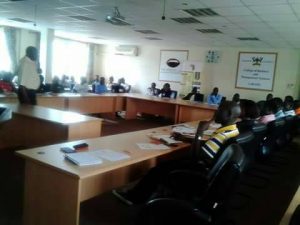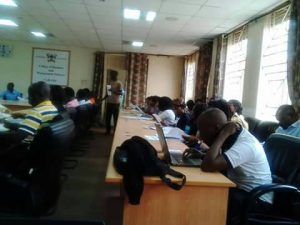This blog is part of the event report series on International Open Data Day 2018. On Saturday 3 March, groups from around the world organised over 400 events to celebrate, promote and spread the use of open data. 45 events received additional support through the Open Knowledge International mini-grants scheme, funded by Hivos, SPARC, Mapbox, the Hewlett Foundation and the UK Foreign & Commonwealth Office. The events in this blog were supported through the mini-grants scheme under the Follow the Money theme.
Public contracts mean a lot to every Ugandan. It is a means through which many citizens receive government services or face frustrations with failure of services. Yet many Ugandans remain unaware of what government has contracted, they service they are to provide, to whom, when, where and how.
Short as these questions may appear, they are important to determine whether citizens will get services paid for by governments, in the right quantities and quality. This was revealed by a recent contracts monitoring report by Africa Freedom of Information Centre (AFIC) in which 79% of contracts accessed were not reflected in procurement plans as required, up to 95% of contracts were being procured through selective bidding, contract prices being determined by source of funding rather than technical designs and scope of work, revealing of high possibility of collusion and fraud. This work was done with support from the World Bank’s Global Partnership for Social Accountability (GPSA). Access to information was enabled by use of information requests and visiting the Government Procurement Portal that was recently aligned to the Open Contracting Data Standards following AFIC’s advocacy to the Public Procurement and Disposal of Public Assets Authority (PPDA)
The main lesson from this finding was a positive government attitude to the feedback: all districts where monitoring was done accepted findings and committed to implement recommendations. The Minister of finance alongside PPDA also agreed to strengthen oversight of contracting processes as well as training procurement entities on the law, procedures and disclosure requirements.


Open Data Day
To create awareness about the Government Procurement Portal and use of the Askyourgov.ug portal to access public information, AFIC in collaboration with PPDA organized an Open Data Day 2018 clinic for students pursuing bachelor’s degree in procurement at Makerere University. The event aimed to create awareness about their right to information, open contracting, share experience and the tools available to enable them exercise their rights and participate in public contracting.
Prior to the symposium, students were tested on their level of awareness and practice regarding access to information and open contracting. The purpose of this activity was to gain appreciation of their level of awareness in order to pitch the discussions accordingly. It was also to facilitate measurement of the effect of the event on participants. Altogether, seventy one (36 male and 35 female) students attended. A Twitter session accompanied the process in order to engage a wider audience beyond those who were in the room. The results of the assessments are presented here below.
At the end of the event, an evaluation questionnaire was administered among participants to determine effectiveness of the training. When asked as to whether Uganda had an Access to Information Act in the pretest, 37% answered in affirmative, 28% said no while 35% were not sure. This implies that the majority, 63% of the participants didn’t have knowledge of the existence of an access to information law at the beginning of the training. Considering that there were university students, it implies that the level of awareness among the general population is even lower. When asked the same question at the end of the clinic, a significant majority, 85% answered in affirmative while 7% said no while 9% were not sure. This means that at least 48% of the participants had actually gained information about the existence of the ATI law from this training. 18% of the participants who were not aware or not sure could be explained by the fact that some of the students came late and found when the session had started.

Another area where participants were tested awareness was who the information officer under the Act was. In the pre-test, it was found that 79% did not know who the officer was while 21% didn’t know or were not sure. At the end of the training the number of students who didn’t know the Information Officer of public agencies in terms of the Access to Information Act had reduced to 30%.

When asked about their awareness of the existence of the Askyourgov portal (www.askyourgov.ug), 77% indicated they were not aware while 23% had heard about the portal but never used it before. This portal was developed by AFIC in collaboration with the Office of the Prime Minister in 2014 in order to facilitate filing of online information requests. The portal has an advantage that both filed requests and responses are deposited on the portal, limiting the possibility of repeat questions. The portal also generates statistics on requests received and how agencies have dealt with requests as well as feedback from requestors. Following the training 93% of the participants said they were aware about the Askyourgov portal, a significant gain from the clinic. During the workshop the students were aided to register and use the Ask Your Gov portal.

Open contracting was one of the topics prepared to create awareness on amongst the participants. In this regard, the students were asked what they understood by public contracting and they pretty much could relate with the concept. Prior the session, the participants were tasked to list at least 5 problems that they knew about that were associated with public contracts. Among the problems listed included; Bribery, Limited Skills, Bureaucracy, Lack of information, Fraud, Mismanagement, Non-disclosure, Substandard work, No response, Corruption, Embezzlement, Incomplete contracts, Poor work done, Conflict of interest, Nepotism, Delays and Collusion. An in-depth analysis was done to identify the most considered problems and the illustration below shows the most identified problems in public procurement by the students or procurement. At least every one of the participants was aware of problems associated with public contracting with corruption, delays and secrecy being ranked high.

Procurement students were asked whether they knew about the existence of the Government Procurement Portal where procurement data is published. In the pre-test a significant proportion 60%, knew about the existence of the portal. However, those that didn’t know were significant at 40%. The post test revealed that a greater majority, 96% of the participants were now aware.
Having trained them on the access to information Act, the Government Procurement Portal and the Askyourgov portal, students were encouraged to file information requests. In the brainstorm students indented many pieces of information they were going to request access.

Dr. Catherine Mbide, the Head of Procurement Department at Makerere University commended AFIC for organizing the training. She recalled how she was forced to change her research topic for her doctorate studies due to lack of access to information. She invited AFIC and PPDA to consider a long term collaboration on open contracting and access to information with the University.
This was a very exciting event and the enthusiasm and commitment by students and their lecturers demonstrated eagerness.








